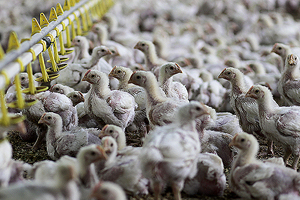Thai broiler production costs increase as price drops

The Thai broiler industry has seen production costs increase with higher prices for soybean and corn; at the same time, prices for live broilers and chicken meat have declined due to a supply glut derived from increased broiler production.
The official forecast for broiler production in 2012 is 1.4 million metric tons (MMT), however unofficial estimates are as high as 1.55 MMT in 2012 and 1.45 MMT for 2013, according to a recent USDA report.
Unofficial estimates are for exports to grow 15% to 540,000 MT in 2012 mainly because the EU and several other countries lifted their bans on imported Thai uncooked chicken meat products. Domestic consumption of broiler meat continues to grow primarily because quick service restaurants (QSR) and ready-to-eat markets have expanded and chicken meat is less expensive than other meats.
The ongoing expansion of broiler production capacity in 2011 and early 2012, as well as fewer incidents of disease-caused damages, led to an increase in broiler meat production. It is anticipated that most producers will scale down their broiler meat production in the last quarter of 2012 and most of 2013 due to a significant reduction in prices for chicken meat products and escalating world prices for main feed ingredients (soybean meal and corn).
Average live broiler production costs in the first seven months (Jan-July) of 2012 were 36-38 baht/kg which are similar to those in the same period of 2011. The impact of higher feed prices was offset by sharply reduced chick prices for the first half of 2012. The costs of chicks in 2012 dropped to 6-13 baht/bird from an average of 16-18 baht/bird in 2011, because of a supply glut of chicks.
Despite the outlook of a decline in broiler meat production in 2013, Thailand’s broiler meat exports should grow another 7% to 580,000 metric tons. Most of the growth is expected to take place in markets other than the EU and Japan, including ASEAN countries Hong Kong, South Korea, UAE, and South Africa. The EU and Japan will remain Thailand’s major markets accounting for about 75-80% of total exports. Thailand could dramatically increase its exports of uncooked chicken meat if Japan and South Korea lift their bans on the import of uncooked Thai broiler meat. Countries that have already lifted their HPAI bans on Thai uncooked frozen chicken meat include the EU, Hong Kong, South Africa, Bahrain, and Russia.
 Beheer
Beheer




 WP Admin
WP Admin  Bewerk bericht
Bewerk bericht